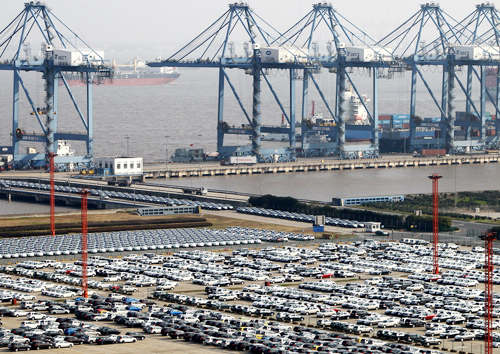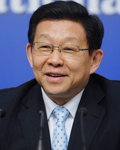 |
|
BUSY PORT: The throughput of Shanghai Port exceeded 30 million standard containers in 2011 (CHEN FEI) |
Trade prospects
 |
|
Chen Deming (WEI YAO) |
Chen Deming: In January 2012, China's exports and imports both registered negative growth. This was largely affected by the Spring Festival holiday (January 22-28). In fact, since last August, our export growth has begun declining. In August 2011, the growth rate was 27 percent, but the figure dropped to 12 percent in December 2011.
The slowdown of export growth is primarily attributed to the deteriorating external and internal environment due to the spread of the global financial crisis, euro-zone sovereign debt crisis and the rising cost in the domestic market.
Although it's in the cards for China to realize the 10-percent growth of foreign trade, a goal mentioned in Premier Wen's government work report, there is still an arduous journey ahead.
To this end, efforts should be made in the following three aspects.
First, we should maintain the stable growth of foreign trade and keep foreign trade policies steady.
Second, we should adjust the structure of foreign trade and facilitate the transformation of its development model.
Third, we'll try to achieve trade balance. While stabilizing exports, we'll encourage imports of advanced technology, key equipment, raw material and marketable consumer goods, to gradually eliminate our trade surpluses with our major trade partners. More opportunities should be given to less developed countries and emerging economies to develop trade relationships with China.
China has witnessed a drop in trade surplus for four straight years. Last year our surplus was reduced to more than $150 billion, equivalent to 2.1 percent of the GDP. The United States called for all nations to contain the ratio of trade surplus against GDP within 4 percent at a G20 summit. China has really set a good example by reducing its surplus year by year.
Last year, China's outbound direct investment (ODI) saw a slight increase with non-financial investment exceeding $60 billion. We predict a continual growth over the following few years.
While Chinese companies have invested overseas, many lessons can be drawn. To penetrate into overseas markets, Chinese companies should acquaint themselves with the background information of the target countries such as national conditions, laws, trade unions and local investment policies. Investment should be made in an active and prudent way.
We've also noticed that Chinese investments are welcome in many countries. With the rising labor cost in the domestic market, China has to transfer some of its industries to the rest of the world. It's mutually beneficial. Our investment in the United States and Europe last year saw substantial growth, especially in Europe. Our investment there helped create jobs for local people and contribute to local tax revenue. Even if some congressmen harp on China, Chinese companies, including state-owned ones, are still welcome in some American cities and states.
Chinese state-owned enterprises are conducting joint stock reform and implementing a modern enterprise system. Now, they are treated as equals with other companies both at home and abroad. On the basis of fair and equality, the WTO, as well as other international institutions, has never made any discriminative decisions towards China's state-owned enterprises.
The WTO classifies subsidies into two categories: prohibited and actionable subsidies. The concept of actionable subsidies is so general that most WTO members hold different explanations about the subsidies they dispense. For example, after the breaking out of the global financial crisis, many countries, in particular the United States, began to allocate some of the government revenue to prop up enterprises in various fields, such as the three auto giants (GM, Ford and Chrysler). Compared to the United States, China, responding to the opposed voices of protectionism from the G20, refused to adopt any protecting measures. Moreover, we have never complained about these protectionist actions of other countries or launched large-scale anti-subsidy campaigns.
China will follow the rules set by international organizations in which we have a membership. China has no obligation to comply with the rules and regulations set out by other countries.
| 